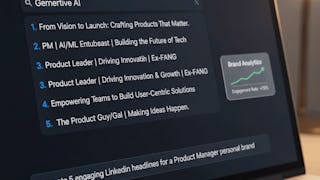- Browse
- Optimization
Optimization Courses
Optimization courses can help you learn techniques for improving performance, resource allocation, and decision-making processes. You can build skills in linear programming, heuristic methods, and simulation modeling, that support analyzing complex systems. Many courses introduce tools like Excel Solver, MATLAB, and Python libraries such as SciPy, enabling you to apply optimization methods to real-world problems in logistics, finance, and operations management.
Popular Optimization Courses and Certifications
 Status: NewNewStatus: Free TrialFree TrialC
Status: NewNewStatus: Free TrialFree TrialCCoursera
Skills you'll gain: Search Engine Optimization, Web Analytics and SEO, Competitive Intelligence, Keyword Research, Performance Analysis, Market Intelligence, Market Analysis, Auditing, Gap Analysis
Beginner · Course · 1 - 4 Weeks
 Status: NewNewStatus: Free TrialFree TrialA
Status: NewNewStatus: Free TrialFree TrialAAlex Genadinik
Skills you'll gain: Keyword Research, Search Engine Optimization, Web Analytics and SEO, Blogs, Competitive Analysis, Quality Assessment, Relationship Building, Content Strategy, Content Creation
Mixed · Course · 1 - 3 Months
 Status: NewNewStatus: Free TrialFree TrialA
Status: NewNewStatus: Free TrialFree TrialAAlex Genadinik
Skills you'll gain: Instagram, Facebook, TikTok, Copywriting, Social Media Marketing, Social Media, Social Media Strategy, Social Media Content, Social Media Management, Search Engine Optimization, Advertising, Marketing, Advertising Campaigns, Social Media Campaigns, Digital Advertising, Sales Presentation, Web Analytics and SEO, Marketing Automation, Drive Engagement, Case Studies
Beginner · Specialization · 3 - 6 Months
 Status: NewNewStatus: PreviewPreviewA
Status: NewNewStatus: PreviewPreviewAAI CERTs
Skills you'll gain: Prompt Engineering, Search Engine Optimization, Keyword Research, Blogs, Writing and Editing, Content Creation, Generative AI Agents, Web Content, Copywriting, Workflow Management, AI Personalization, Business Writing, Generative AI, AI Enablement, Content Strategy, Writing, Editing, Artificial Intelligence, Artificial Intelligence and Machine Learning (AI/ML), Responsible AI
Intermediate · Course · 1 - 3 Months
 Status: Free TrialFree Trial
Status: Free TrialFree TrialSkills you'll gain: Email Marketing, Paid media, Target Audience, Data Storytelling, Social Media Marketing, Social Media Strategy, Content Creation, Search Engine Optimization, Marketing Budgets, Order Fulfillment, Media Planning, Search Engine Marketing, Google Ads, Social Media Management, Customer Retention, Customer Relationship Management, E-Commerce, Performance marketing, Email Automation, Marketing
4.8·Rating, 4.8 out of 5 stars4.7K reviewsBeginner · Professional Certificate · 3 - 6 Months
 Status: NewNewStatus: Free TrialFree Trial
Status: NewNewStatus: Free TrialFree TrialSkills you'll gain: Performance Analysis, Brand Awareness, AI Enablement, Storytelling, Content Development and Management, Multimedia, Prompt Engineering, Data Storytelling, Creativity, Search Engine Optimization, Emerging Technologies, Visionary, Professional Networking
Beginner · Course · 1 - 3 Months
 Status: NewNewStatus: PreviewPreview
Status: NewNewStatus: PreviewPreviewSkills you'll gain: Hardware Design, Field-Programmable Gate Array (FPGA), Data Structures, Systems Design, Application Specific Integrated Circuits, Electronic Systems, Computer Engineering, Verification And Validation, Embedded Systems, Software Design, Simulation and Simulation Software, Test Engineering, Programming Principles, Data Synthesis, Analysis, Design, Process Optimization
Intermediate · Course · 1 - 4 Weeks
 Status: NewNewStatus: Free TrialFree TrialA
Status: NewNewStatus: Free TrialFree TrialAAlex Genadinik
Skills you'll gain: Search Engine Optimization, Keyword Research, Web Analytics and SEO, Blogs, Social Media Marketing, Product Knowledge, Lead Generation, Marketing, Pay Per Click Advertising, Content Marketing, Marketing Strategies, Email Marketing, WordPress, Target Audience
Mixed · Course · 1 - 3 Months
 Status: NewNewStatus: Free TrialFree TrialA
Status: NewNewStatus: Free TrialFree TrialAAlex Genadinik
Skills you'll gain: Search Engine Optimization, Generative AI Agents, Email Automation, Sales Strategy, Advertising, Marketing Channel, Inside Sales, AI Orchestration, Online Advertising, Marketing, Performance marketing, Product Promotion, Content Marketing, Marketing Strategies, AI Workflows, Entrepreneurship, Web Analytics, New Business Development, Agentic systems, Prompt Engineering
Beginner · Specialization · 3 - 6 Months
 Status: PreviewPreviewU
Status: PreviewPreviewUUniversidade de São Paulo
Skills you'll gain: Search Engine Marketing, Digital Marketing, Email Marketing, Google Ads, Marketing Strategies, Search Engine Optimization, Google Analytics, Online Advertising, A/B Testing, Pay Per Click Advertising, Advertising Campaigns, Web Analytics, Digital Advertising, Facebook, Campaign Management, Marketing Analytics, Return On Investment, Performance Measurement
4.7·Rating, 4.7 out of 5 stars2.3K reviewsBeginner · Course · 1 - 3 Months
 Status: NewNewStatus: Free TrialFree TrialA
Status: NewNewStatus: Free TrialFree TrialAAlex Genadinik
Skills you'll gain: Blogs, Search Engine Optimization, Copywriting, Web Analytics and SEO, Web Content, Keyword Research, Content Creation, Sales Strategy, Content Strategy, Generative AI, E-Commerce
Mixed · Course · 1 - 3 Months
 Status: NewNewStatus: Free TrialFree TrialA
Status: NewNewStatus: Free TrialFree TrialAAlex Genadinik
Skills you'll gain: E-Commerce, Entrepreneurship, Blogs, Content Creation, Digital Content, Digital Publishing, Web Content, Pay Per Click Advertising, Video Production, Lead Generation, Marketing Channel, Email Marketing, Business Strategies, Search Engine Optimization, Advertising, Brand Strategy
Mixed · Course · 1 - 3 Months
In summary, here are 10 of our most popular optimization courses
- Audit SEO Gaps with SEMrush Reports: Coursera
- 2026 SEO Link Building: #1 SEO Ranking Tactic (Backlinks): Alex Genadinik
- Social Media Marketing: Funnels, Pixels, and Optimizations: Alex Genadinik
- AI for Professional Writing: AI CERTs
- Google Marketing Digital e E-Commerce: Google
- Apply Generative AI to Build a Powerful Personal Brand: EDUCBA
- SystemVerilog Tutorials: Hardware Design & Verification: Coursera
- Beginner Affiliate Marketing: Start Earning On Day 1: Alex Genadinik
- Affiliate Marketing For Passive Income: Alex Genadinik
- Marketing Digital: Universidade de São Paulo










